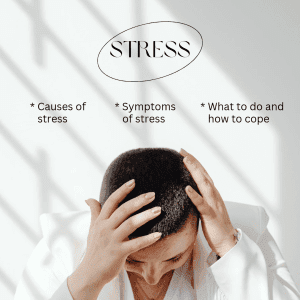In the hustle and bustle of our daily lives, stress has become an unavoidable companion. While stress is a natural response to challenges, excessive and prolonged stress can take a toll on our physical and mental well-being. In this comprehensive guide, we’ll explore the intricacies of stress, its impact on health, and effective strategies for managing stress in daily life. From identifying stressors to implementing practical coping mechanisms, let’s navigate the path toward a more balanced and stress-resilient lifestyle.
Stress management in daily life
- Recognizing the Signs of Stress
Understanding stress begins with recognizing its signs and symptoms. Stress manifests differently for everyone, but common indicators include irritability, fatigue, headaches, and changes in sleep patterns. By being attuned to these signals, individuals can take proactive steps to address stress before it becomes overwhelming.
- Identifying Stressors: Unveiling the Culprits
To effectively manage stress, it’s crucial to identify the specific stressors triggering the response. Stressors can be external, such as work pressures or financial concerns, or internal, like unrealistic expectations or negative self-talk. Pinpointing these stressors is the first step in gaining control over the situation.
- Implementing Mindfulness and Relaxation Techniques
Mindfulness and relaxation techniques are powerful tools for managing stress. Practices such as deep breathing, meditation, and progressive muscle relaxation can help calm the mind and reduce the physiological effects of stress. Incorporating these techniques into daily routines fosters a sense of tranquility and resilience.
- Establishing Healthy Lifestyle Habits
A healthy lifestyle serves as a robust defense against stress. Regular physical activity, a balanced diet, and adequate sleep contribute to overall well-being and help the body cope with stress more effectively. Establishing these habits creates a solid foundation for stress management.
- Effective Time Management: Prioritizing and Organizing
Poor time management is a common source of stress. Prioritizing tasks, breaking them into manageable steps, and setting realistic deadlines can alleviate the feeling of being overwhelmed. Effective time management empowers individuals to take control of their schedules and reduce unnecessary stress.
- Cultivating a Supportive Social Network
Social connections play a pivotal role in stress management. Cultivating a supportive social network provides an outlet for sharing concerns, receiving advice, and gaining perspective. Whether through friends, family, or support groups, fostering connections strengthens emotional resilience.
- Learning to Say No: Setting Boundaries
Overcommitting can contribute to elevated stress levels. Learning to say no and setting boundaries is a crucial skill in managing stress. By prioritizing responsibilities and understanding personal limits, individuals can avoid unnecessary strain and maintain a healthier work-life balance.
- Professional Help: Seeking Counseling or Therapy
Sometimes, managing stress requires professional assistance. Seeking counseling or therapy provides a structured and supportive environment to explore the root causes of stress and develop effective coping strategies. Professional help can be instrumental in navigating challenging life situations.
- Engaging in Hobbies and Leisure Activities
Engaging in hobbies and leisure activities offers a welcome break from daily stressors. Whether it’s reading, painting, or playing a musical instrument, dedicating time to enjoyable pursuits provides a mental and emotional recharge, promoting resilience against stress.
- Regular Self-Reflection: Evaluating and Adjusting
Regular self-reflection is integral to stress management. Taking the time to evaluate stress levels, identify triggers, and assess coping mechanisms allows for necessary adjustments. A proactive approach to self-reflection empowers individuals to continuously refine their stress management strategies.
Conclusion
Understanding and managing stress in daily life is a continuous journey that involves self-awareness, proactive strategies, and a commitment to overall well-being. By recognizing the signs of stress, identifying stressors, and implementing practical coping mechanisms, individuals can navigate life’s challenges with resilience and balance. Whether through mindfulness techniques, healthy lifestyle habits, or seeking professional help when needed, the path to stress management is a personalized exploration toward a more fulfilling and stress-resilient life.


